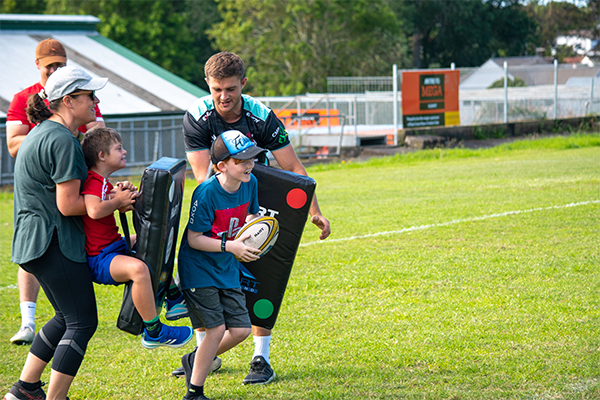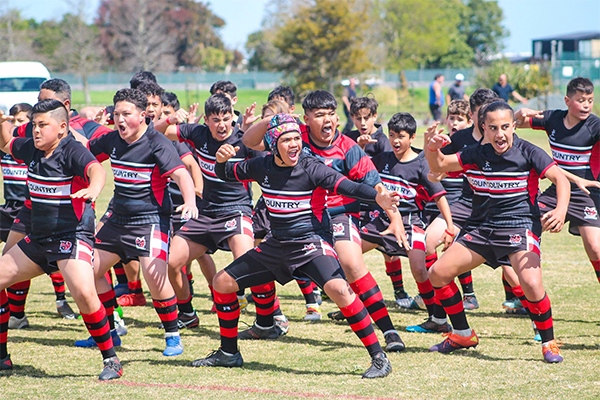Finalist

Aktive is driving understanding of disability and accessibility across the sporting sector workforce to give Aotearoa’s disabled tamariki and rangatahi better and more equitable opportunities to participate in physical activity.
A charitable trust with a vision of making Auckland the world’s most active city, Aktive (Auckland Sport and Recreation) is responsible for leading, influencing and advocating for initiatives and programmes that target groups that are missing out. These include tamariki and rangatahi, girls and young women, Māori, Pacific, Chinese, Indian and disabled young people.
Aktive has strategic partnerships with Sport New Zealand and Auckland Council and works closely with local sport and recreation bodies including Sport Auckland, Sport Waitākere, Harbour Sport and CLM Community Sport (covering the Manukau region).
Research shows that disabled tamariki and rangatahi in New Zealand are less active in both organised and unstructured physical activity. Cost, lack of adaptive programmes and transportation all contribute to this inequity, however the biggest barrier to participation is the lack of disability awareness and responsiveness in society.
“While the disabled community comprises 25 per cent of the New Zealand population, the community is largely an afterthought, not only in our sector, but in the overall design of modern society,” says Aktive Inclusion Advisor (Disability) Jenna Baxter.
When Sport New Zealand launched its national Disability Inclusion Fund, committing $3.6m to national and regional organisations for mahi that leads to sustainable changes across the disability spectrum, Aktive developed a Disability Action Plan. The organisation received funding for a two-year project to achieve the goals outlined in the plan.
These include providing sporting sector workforces with the knowledge and skills to support inclusionary practices, creating more alignment and collaboration between the existing organisations that deliver physical activity opportunities for disabled people, delivering resources the sporting sector can share and helping the sector identify and address barriers to participation impacting disabled people.
With input from 23 specialist disability providers and organisations, Aktive developed an Understanding Disability Toolkit and Inclusive Physical Activity Guidelines, both of which provide information, insights, and ideas on including disabled participants in physical activities.
The toolkit is available to any sporting or community organisation via the Aktive website.
To further build capability within the sport and recreation workforce, the organisation developed an Inclusion Training Programme based on the toolkit to dissect the ableism that underpins the sector.
The six-month programme aims to change participants’ view of disability as a social construct, migrating from the medical to the social model of disability, utilising self-reflection on unconscious bias. It also examines the United Nations Convention on the Rights of Persons with Disabilities and measures how well local organisations are adhering to the agreements of Article 30 – participation in recreation, leisure, and sport.
“Initially, we are delivering this programme internally as we believe in the importance of leading by example,” Jenna says. “Once completed, we will extend this training programme to sector providers at regional and national levels.”
Last year Aktive began hosting regional Disability Sports and Recreation Provider Hui as opportunities for the sector to come together to discuss common challenges and share successes. These get-togethers identified a need to increase connectivity between providers and disabled participants through a centralised digital platform.
“We secured additional Sport New Zealand funding to pilot a new, digitally accessible platform called Skillet with 10 providers. The pilot enables smaller providers to utilise a platform that would typically be out of reach due to cost, ultimately exposing them to a larger community of participants.”
The pilot runs from March 2023 to March 2024.

Through the partnership with Sport New Zealand, Aktive is also creating resources for the sector on web accessibility, with guidance on how to be more digitally inclusive.
“Often when we think of disability, we think of the impairments that we can see. Digital accessibility can be overlooked and is therefore a key workstream within our Disability Action Plan,” says Jenna.
Since Aktive began delivering its inclusion training programme in December 2022, three of its local partners have expanded disability programmes in their respective communities, leading to an additional $255,887 in applied regional funding, impacting more than 4,000 tāngata whaikaha across schools and local clubs.
Positive feedback from the training and 90 per cent engagement across Aktive’s 80-strong workforce has driven development and repackaging of the programme so it can be delivered to a wider audience and expand the knowledge and skills of inclusivity across the sector.
After partnering with Aktive to develop digital accessibility resources, Sport New Zealand plans to audit its own website for accessibility and develop an internal training programme for staff on inclusive web content.
Aktive has also collaborated with several disability support organisations, such as Stroke Foundation NZ and the Cerebral Palsy Society, to address the inequity of accessible council facilities across Auckland. It’s leading collaboration between Auckland Council and the disability organisations to develop council’s new Accessible Facilities Plan.
“By shifting the foundation of our workforce’s understanding of disability, we are influencing the sport, active recreation, and play sector to be advocates of accessibility across all workstreams - community and youth sport, school/kura play systems and club and facility design.”


